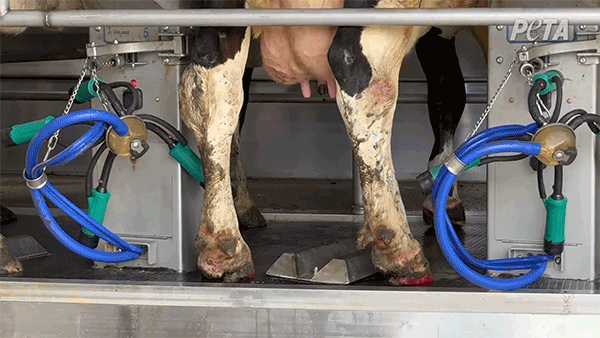UN INT Intro Text w/ Responsive Image - *Important Note* You must UNLINK this shared library component before making page-specific customizations.
Oakridge Dairy LLC, which claims to be the largest dairy in Connecticut, claims it's a “farm of the future” where “happy cows” thrive in “posh living quarters.” But when PETA eyewitnesses toured Oakridge, they found that the facility keeps thousands of cows on concrete and denies them access to the outdoors—and not just so that humans can steal the milk meant for their calves, but also so that their manure can be collected and converted to natural gas. 😡
Here are some of the ways Oakridge glazes itself on its website and social media and why it’s all total B.S.:
“Essentially our 8 acre barn is laid out similar to an outdoor area … our cows have plenty of elbow room.”
The cows are kept in super-crowded conditions where they can’t move freely and find a comfy spot. As for the outside world, they can only gaze out from the sides of the shed at the nearby fields—they never get a chance to experience the grass beneath their feet. 😞

The dairy partners with an energy company in a scheme to collect the cows’ manure and convert it into natural gas inside this structure, a “methane digester.”
Oakridge Dairy confines approximately 2,600 cows to a concrete-floored barn about the size of six football fields.
Imagine the misery of being able to look outside—but never experience it.

Oakridge Dairy—which claims to be Connecticut’s largest dairy—confines approximately 2,600 cows to a concrete-floored barn about the size of six football fields.
“It begins with a happy cow and continues with an exceptional level of care throughout our processes. When we say happy cows make great milk we mean it!”
According to a worker, Oakridge separates cows from their babies within 20 minutes of birth. Cows are known to mourn and cry out when separated from their loved ones—how on Earth would this make the mothers or calves happy?
Calves should be raised by their moms in wide open fields from day one, not ripped from them and put in tiny hutches.

The cows are never allowed outside, where their manure cannot easily be collected, and only leave the barn to be hooked up to this robotic milking machine.
All of the animals in this picture have their own thoughts, feelings, and interests—so why do we cherish one “cow” as a loving member of the fam while exploiting the others?
“We have a dedicated vet area that monitors each and every cow … we watch it all to make sure nothing seems off.”
Cows who were hooked by the udders to a robotic milking machine had swollen joints and apparent pressure sores on their legs. At least one cow seemed reluctant to bear weight on her leg. 😰 Idk about the veterinarian, but that seems “off” to us.

“Our milk is never treated with rBGH and an ill cow is removed from the herd so that she can be treated (just like you would one of your loved ones).”
Would you ever treat your loved ones like this?

“Female calves (heifers) live at our young stock facility until they are about 6 months old and young males (bulls) are raised out west.”
A worker told PETA’s eyewitnesses that when those females reach five months old, they’re shipped to a “grower” in Pennsylvania and returned a year later once forcibly impregnated. And the males aren’t sent out West to chill at a ranch—they’re sent there to be fattened up and then sent to slaughter.

Calves were kept alone in small hutches, having been ripped away from their mothers—a separation that a worker admitted takes place at Oakridge Dairy within 20 minutes of a calf’s birth.
Each of these hutches confines a calf. These babies should be with their moms, but instead, they’ll spend their days confined here.
How is being ripped away from their newborns, forced to exist on concrete and bedding made of their feces, and sent to slaughter after only six or seven years “living their best lives”?
“We believe in sustainable farming practices that will promote the land, our cows, and the community.”
Cow’s milk is never sustainable or humane. Ditching dairy means fewer greenhouse gases entering the atmosphere, fewer nitrates released into the water, and less soil erosion and deforestation. 👌
How to Help
According to South Jersey Industries (SJI)—the utility company that partners with Oakridge to convert the cows’ manure into “clean energy”—there are seven more projects like this at mega-dairies in Michigan and New York, with plans to open more. There are two huge things you can do to help cows avoid suffering at these kinds of facilities. First, don’t consume dairy—get delish vegan milks, cheeses, yogurts, ice creams, and other products instead.
Second, please urge SJI to focus on ventures that don’t require the intensive confinement of cows or any other animals.